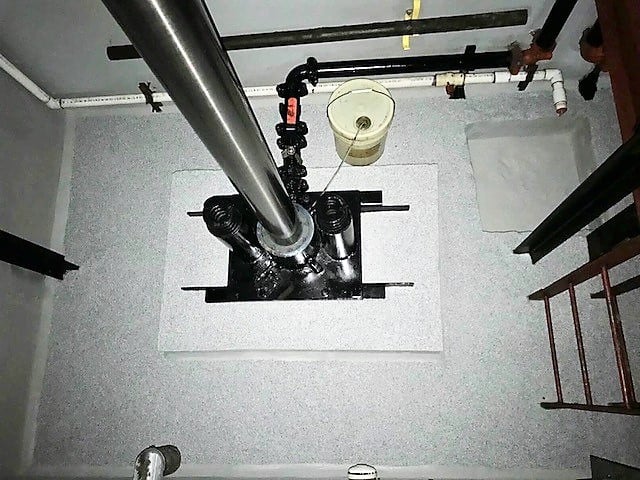 Select Elevator Waterproofing ™
Select Elevator Waterproofing ™
Select Elevator Waterproofing is a multifaceted company specializing in total elevator pit cleaning, waterproofing, and monitoring. Starting in 2014 and still successfully operating as Select Basement Waterproofing ™, we have seen thousands of water-related situations in residential and commercial spaces leading to mold, structural damage and health-related issues. Our team of highly experienced and trained technicians understand the necessity of having a clean, dry, healthy, and safe space to live and work in. This is even more important in a confined space such as in an elevator this is also way elevator waterproofing is important. The patented SAFE PIT® System is a revolutionary water abatement system developed to remove standing water and prevent additional water infiltration into an elevator/escalator pit enclosure. By utilizing CentAir Core™ technology, this system places all state-of-the-art mechanical and electrical components outside of the elevator hoistway and mechanical room. The SAFE PIT® System’s innovative design constantly monitors for water intrusion and removes the water from beneath the pit floor to an external discharge location. This system eliminates costly repairs due to water damage and facilitates a safer building and working environment. The SAFE PIT® System’s components can be adapted to meet local elevators and building codes, even the most recent and stringent ones.
Facts About New Jersey
Delaware Indians
The first people to live on the land now known as New Jersey were the Delaware Indians. They lived here starting at least 10,000 years ago. Anywhere from 8,000 to 20,000 Delaware Indians lived in the area when the first Europeans arrived. Their name means “original people” or “genuine people.” They spoke an Algonquian dialect.
Though they were considered one tribe, the Delaware Indians didn’t act as one unified group. Instead, they lived in small communities made up mostly of extended family members. The men would hunt or fish during the day. Depending on the season they might search for clams off the Jersey shore or hunt in the woods. The women worked in the gardens. They grew squash, beans, sweet potatoes, and corn.
When the first explorers came, the Delaware Indians lived in parts of Delaware, New Jersey, and eastern Pennsylvania. Europeans called them the Delaware Indians.
Colonial Times
Around 1524, Giovanni de Verrazano became the first European to explore New Jersey. He sailed along the coast and anchored off Sandy Hook. The colonial history of New Jersey started after Henry Hudson sailed through Newark Bay in 1609. Although Hudson was British, he worked for the Netherlands, so he claimed the land for the Dutch. It was called New Netherlands.
Small trading colonies sprang up where the present towns of Hoboken and Jersey City are located. The Dutch, Swedes, and Finns were the first European settlers in New Jersey. Bergen, founded in 1660, was New Jersey’s first permanent European settlement.
In 1664 the Dutch lost New Netherlands when the British took control of the land and added it to their colonies. They divided the land in half and gave control to two proprietors: Sir George Carteret (who was in charge of the east side) and Lord John Berkley (who was in charge of the west side). The land was officially named New Jersey after the Isle of Jersey in the English Channel. Carteret had been governor of the Isle of Jersey.
Berkeley and Carteret sold the land at low prices and allowed the settlers to have political and religious freedom. As a result, New Jersey was more ethnically diverse than many other colonies. Primarily a rural society, the colony grew to have about 100,000 people.
Eventually, governing power was transferred back to England. For many years, New Jersey shared a royal governor with New York. The governorship was finally split in 1738 when New Jersey got its own governor, Lewis Morris.
Revolution
In the years before the Revolution, anti-British feelings spread throughout the state. About one-third of the people living here supported the rebels, one-third supported England, and one-third remained neutral. In 1776 New Jersey declared itself an independent state and joined the colonial side in the Revolutionary War.
New Jersey was an important state during the Revolutionary War because of its location near the center of the thirteen colonies and between New York City and Philadelphia. Because of this, more battles were fought in New Jersey than in any other state. The Americans and British fought 100 battles, both large and small, here.
Many people consider the Battle of Trenton to be the turning point of the Revolution. Immediately after winning Trenton, General George Washington won the battle of Princeton. Having lost two battles in a matter of hours, the British fled New Jersey for New York. Washington and his troops spent the rest of the winter in Morristown, and the United States was well on its way to victory.



 Select Elevator Waterproofing ™
Select Elevator Waterproofing ™